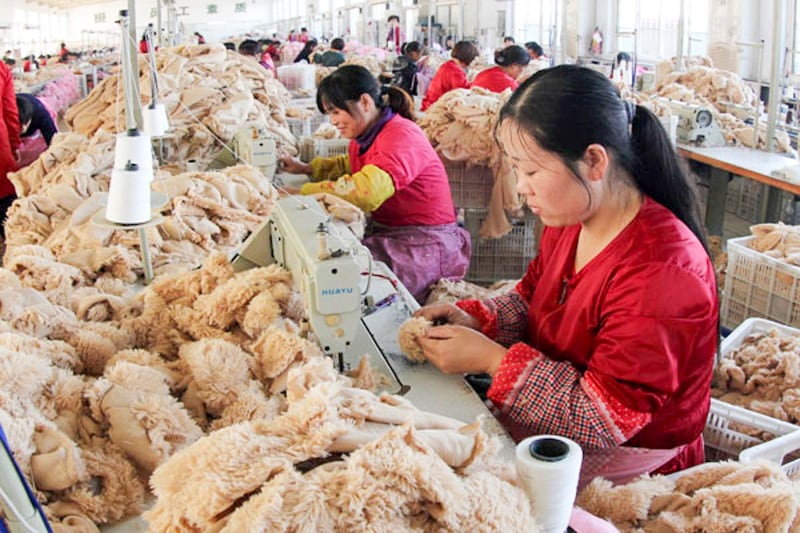On social media, they’re calling them “rotten tail,” or unfinished kids, a play on a metaphor for something that never comes to a clean end but just falls apart, leaving nothing substantial to grasp hold of.
It means that China's bright young things are finding that the future they worked so hard for, much like the welter of unfinished apartment buildings that dot Chinese cities these days, isn't delivering on its promises.
Instead, they're the ones doing the delivering – of food and parcels as part of the insecure gig economy, while some opt to move back in and be "full-time children," economically dependent on their aging parents.
Ruling Chinese Communist Party leader Xi Jinping has vowed that finding jobs for young people is a top priority for his government, and has rolled out a slew of policies in a bid to encourage more hiring, including job fairs and incentives for employers.
Yet in July, as millions of fresh graduates poured into the labor market, unemployment rates reached 17.1% among 16-24 year-olds, according to the latest data from China’s National Bureau of Statistics, ticking up again after a three-month decline.

The figures came amid a social media storm over the lone death of an unemployed graduate from one of China's elite universities, shining a spotlight on widespread unemployment among even highly qualified young people.
Amid the harsh economic climate, China's young people have coined the terms " political depression" and " lying flat" to refer to their sense of hopelessness, and who are increasingly rejecting traditional milestones like finding a job, marriage and children.
“Children from ordinary families used to expect to find a job after graduating from university, but nepotistic recruitment is becoming more and more blatant, and there are fewer and fewer jobs,” human resources professional Yang Peng told RFA Mandarin in a recent interview.
“The poor economy also means fewer jobs, further shrinking opportunities for young people to find jobs and change their lives,” he said.
And Yang has noticed a sharp fall in activity levels among his fellow professionals on social media, suggesting a sluggish labor market all round.
“I’m in a human resources group with about 350 members,” he said. “A lot of human resources professionals have been laid off since the beginning of this year, and are looking for jobs themselves.”
The social contract
U.S.-based financial commentator Wang Jian said that fewer and fewer young people in China are seeing any kind of return on the massive investment they and their families have made in their education.
“Society hasn’t kept its promises,” Wang said, adding that this will add up to greater political pressure on the ruling Chinese Communist Party.

“The legitimacy of the Chinese Communist Party regime is based on power in return for protection and continuous improvements to people’s lives,” he said. “That’s the social contract.”
"For many Chinese college graduates, better job prospects, upward social mobility, a sunnier life outlook – all things once promised by a college degree – have increasingly become elusive," Reuters quoted Yun Zhou, assistant professor of sociology at the University of Michigan, as saying.
A recent survey cited by Big Data China found that overall attitudes have become more pessimistic in China in recent years, particularly regarding perceptions of inequality, with people far more likely to blame the economy for poverty than themselves in recent years.
In surveys conducted between 2004 and 2014, respondents identified “lack of ability,” “lack of effort,” and “low education” as the main factors that explained poverty in China.

By 2023, respondents were opting for “unequal opportunity” as the top reason for poverty, with “an unfair economic structure” ranking third, with “education” second, although the survey authors pointed out that “uneven access to education in China is in itself a source and a symptom of widespread and persistent inequality.”
The number of respondents who disagreed with the statement, “Whether a person becomes rich or remains poor is their own responsibility,” increased from 25% in 2004 to 48% in 2023, the survey found.
Meanwhile, those who agreed with the statement, “In our country, effort is always rewarded,” dropped from 62% to 28% between 2004 and 2023, it said.
"[The] surveys show that people in China today have less confidence than in earlier decades that the country's economic system and institutions provide fair opportunities for members of society," Big Data China authors Ilaria Mazzocco and Scott Kennedy wrote in a July 9 article summarizing the research.
Translated by Luisetta Mudie.
